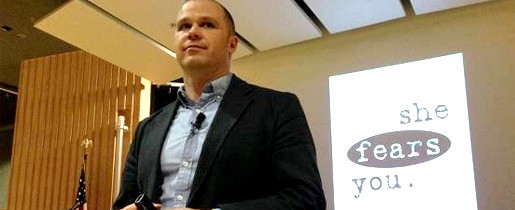By Golzar Meamar, Managing Editor
In the midst of midterms, a modest number of students and faculty went to Swasey to hear Keith Edwards give a presentation focusing on the effects of masculinity on young men.
Dr. Keith Edwards is a national speaker on masculinity and sexual assault prevention and was brought to campus by the Community Sexual Misconduct Awareness and Response Team (CSMART) and by the Sexual Harassment and Rape Education (SHARE) program.
On Thursday, March 13, he shared his dissertation with the campus in two different forums: once early in the day in a CSMART meeting, which was also attended by SHARE advocates, and then again in Swasey at 7 p.m.
His dissertation, “Putting my man face on: a grounded theory of college men’s gender identity development,” focused on how the gender identity of ten college men had developed until college and continued throughout. Edwards said his dissertation aimed to “understand how patriarchy is learned, internalized, perpetuated and perhaps transcended.”
He began with statistics that painted the beginnings of the story. There is a lowered rate of male enrollment in college with an especial decrease in “oppressed groups.” At the same time, the number of women who choose to attend college has increased.
At college, Edwards reports that statistically, men spend most of their time “partying, working out, playing video games and watching TV” more frequently than women do. Women “volunteer, study, get involved in student organization and help out with family” more often than men do. According to Edwards’ presentation, college men are also more likely to “perpetrate violent sexual assault,” they have a “higher suicide rate,” “consume more alcohol in more dangerous ways” and are “more likely to be involved in campus conduct.”
These statistics set up the story Edwards told: the story the ten men intertwined all told about masculinity. Edwards learned these men had high expectations for themselves in terms of the traditional idea of masculinity. The ideas of being social and how they are tied to consumption of alcohol and how social cues call for men to be less sensitive and live college like it is the “spring break of your life.”
Edwards expressed that masculinity was like a mask; putting on a tough face for the crowd. He said that there were consequences to trying to live up to the “tough guy” expectation, especially in terms of relationships, mental health and even physical health. Specific consequences included a “loss of authenticity” and a “loss of humanity.”
Edwards challenged the men in the room to “stop performing, [and] be who you are.” He brought the message to campus that listening goes a long way, as does breaking out of the mask of masculinity.

